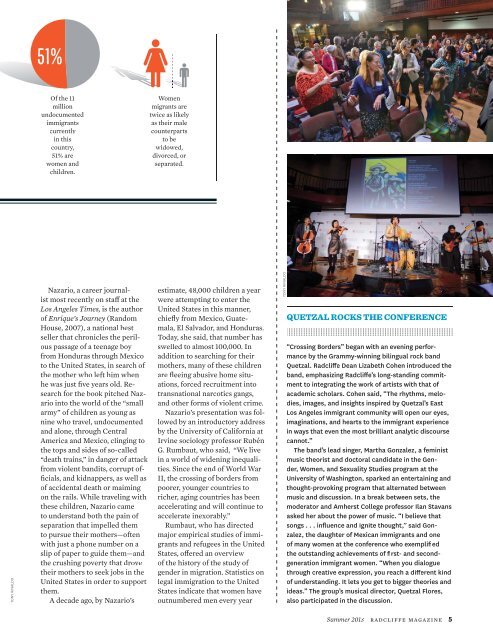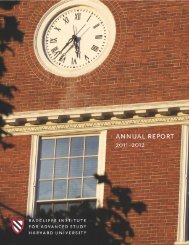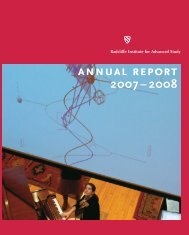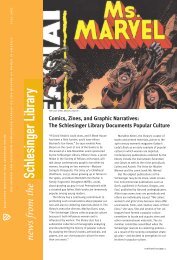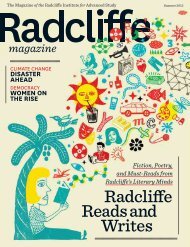Download - Radcliffe Institute for Advanced Study - Harvard University
Download - Radcliffe Institute for Advanced Study - Harvard University
Download - Radcliffe Institute for Advanced Study - Harvard University
Create successful ePaper yourself
Turn your PDF publications into a flip-book with our unique Google optimized e-Paper software.
Of the 11<br />
million<br />
undocumented<br />
immigrants<br />
currently<br />
in this<br />
country,<br />
51% are<br />
women and<br />
children.<br />
Women<br />
migrants are<br />
twice as likely<br />
as their male<br />
counterparts<br />
to be<br />
widowed,<br />
divorced, or<br />
separated.<br />
TONY RINALDO<br />
ist most recently on staff at the<br />
Los Angeles Times, is the author<br />
of Enrique’s Journey (Random<br />
House, 2007), a national best<br />
seller that chronicles the perilous<br />
passage of a teenage boy<br />
from Honduras through Mexico<br />
to the United States, in search of<br />
the mother who left him when<br />
he was just five years old. Re-<br />
search <strong>for</strong> the book pitched Nazario<br />
into the world of the “small<br />
army” of children as young as<br />
nine who travel, undocumented<br />
and alone, through Central<br />
America and Mexico, clinging to<br />
the tops and sides of so-called<br />
“death trains,” in danger of attack<br />
from violent bandits, corrupt officials,<br />
and kidnappers, as well as<br />
of accidental death or maiming<br />
on the rails. While traveling with<br />
these children, Nazario came<br />
to understand both the pain of<br />
separation that impelled them<br />
to pursue their mothers—often<br />
with just a phone number on a<br />
slip of paper to guide them—and<br />
the crushing poverty that drove<br />
their mothers to seek jobs in the<br />
United States in order to support<br />
them.<br />
A decade ago, by Nazario’s<br />
estimate, 48,000 children a year<br />
were attempting to enter the<br />
United States in this manner,<br />
chiefly from Mexico, Guate-<br />
mala, El Salvador, and Honduras.<br />
Today, she said, that number has<br />
swelled to almost 100,000. In<br />
addition to searching <strong>for</strong> their<br />
mothers, many of these children<br />
are fleeing abusive home situ-<br />
ations, <strong>for</strong>ced recruitment into<br />
transnational narcotics gangs,<br />
and other <strong>for</strong>ms of violent crime.<br />
Nazario’s presentation was followed<br />
by an introductory address<br />
by the <strong>University</strong> of Cali<strong>for</strong>nia at<br />
Irvine sociology professor Rubén<br />
G. Rumbaut, who said, “We live<br />
in a world of widening inequalities.<br />
Since the end of World War<br />
II, the crossing of borders from<br />
poorer, younger countries to<br />
richer, aging countries has been<br />
accelerating and will continue to<br />
accelerate inexorably.”<br />
Rumbaut, who has directed<br />
major empirical studies of immigrants<br />
and refugees in the United<br />
States, offered an overview<br />
of the history of the study of<br />
gender in migration. Statistics on<br />
legal immigration to the United<br />
States indicate that women have<br />
outnumbered men every year<br />
TONY RINALDO<br />
QUETZAL ROCKS THE CONFERENCE<br />
“Crossing Borders” began with an evening per<strong>for</strong>mance<br />
by the Grammy-winning bilingual rock band<br />
Quetzal. <strong>Radcliffe</strong> Dean Lizabeth Cohen introduced the<br />
band, emphasizing <strong>Radcliffe</strong>’s long-standing commit-<br />
ment to integrating the work of artists with that of<br />
academic scholars. Cohen said, “The rhythms, melodies,<br />
images, and insights inspired by Quetzal’s East<br />
Los Angeles immigrant community will open our eyes,<br />
imaginations, and hearts to the immigrant experience<br />
in ways that even the most brilliant analytic discourse<br />
cannot.”<br />
The band’s lead singer, Martha Gonzalez, a feminist<br />
music theorist and doctoral candidate in the Gender,<br />
Women, and Sexuality Studies program at the<br />
<strong>University</strong> of Washington, sparked an entertaining and<br />
thought-provoking program that alternated between<br />
music and discussion. In a break between sets, the<br />
moderator and Amherst College professor Ilan Stavans<br />
asked her about the power of music. “I believe that<br />
songs . . . influence and ignite thought,” said Gon-<br />
zalez, the daughter of Mexican immigrants and one<br />
of many women at the conference who exemplified<br />
the outstanding achievements of first- and second-<br />
generation immigrant women. “When you dialogue<br />
through creative expression, you reach a different kind<br />
of understanding. It lets you get to bigger theories and<br />
ideas.” The group’s musical director, Quetzal Flores,<br />
also participated in the discussion.<br />
Summer 2013 radcliffe magazine 5


